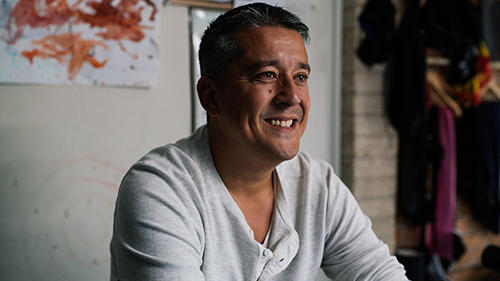From a young age, Craig Killian believed that he would one day have to become ‘the impossible man’.
To Craig, this was the idea of the type of person he had to be. The type of man he had to be.
Someone who was masculine and strong. Someone who worked hard and earned lots of money. Someone who kept their problems to themselves.
The idea was daunting. Because to Craig, being that person seemed... impossible.
For years, he pushed the idea to the back of his mind. But when Craig found out he was going to be a father, it soon occupied his every thought. And so he tried to do the impossible. Be the impossible.
The pressure mounted, both at work and at home, and his mental health plummeted.
Growing up tough
Craig and his two brothers were brought up in a country town in New South Wales by their Filipino mother and Australian father, a horse trainer.“I was raised in that old-school tradition of ‘boys don’t cry’, and these standards were even more ingrained when I was with my brothers,” remembers Craig.
“There wasn’t much time for weakness.”
But this didn’t mean he disliked his father. On the contrary.
“My dad was the most amazing man I knew. He taught me so much about love and family, and he did his best with what he was taught as a kid.”
When Craig got to high school, the pressure to ‘be a man’ intensified.
“I never really fit in at school. They would talk about girls and fights and sport. I was never good at any of it, but the pressure was always there,” says Craig.
Mental health concerns surface
After Craig finished high school, he was still often confronted by unrealistic and sometimes toxic male standards.He found himself overthinking a lot, critiquing every little decision he made.
He was having regular arguments with himself in his head, often about trivial things.
He started to feel stressed all the time, which led to feeling tired. But sleeping proved difficult too, as Craig couldn’t calm his thoughts and was constantly restless.
This cycle continued for years. Yet Craig never felt he could talk to anyone about how he was feeling.
When he was 25, Craig’s dad died. In the same week, Craig was evicted from the house he was renting. He had his mobile phone cut off. And he found out his then-partner had cheated on him.
Still, Craig dealt with all of this himself.
Because that was how he thought the impossible man should handle it.
Dealing with fatherhood
Two years later, Craig moved to Newcastle. By this stage, the notion of the impossible man had faded. Not long after the move, Craig met Brooke, who would later become his wife. They hit it off straight away and it wasn’t long before they were engaged.
Then came the news that excited and terrified Craig at the same time. They were going to be parents.
“The thought of being a dad never scared me. It excited me. But when my wife told me she was pregnant, I imagined the impossible man waking after years of slumber,” says Craig.
“I suddenly needed to take my career more seriously. I needed to act and sound more professional, and less like the goofball I usually was.”
Craig started putting in longer hours at work. He was promoted to a high-level manager position with his own office and budgets to manage. Craig’s wife noticed the changes. They worried her.
“It took a lot of energy out of me trying to be someone I wasn’t, and this hurt my wife. I was not the man she fell in love with.”
When Craig’s son was born, he was overjoyed. But he was so busy at work, he was barely home to spend any time with his family.
And when he did get home, he was so drained all we wanted to do was be left alone, or to sleep.
Losing control
By this stage, Craig was drinking five coffees a day, sleeping poorly and had lost a lot of weight. His performance at work was declining. And he was still struggling to be present at home.
One day, Craig was sitting in his car, having just pulled up at the office. Suddenly, it was like he didn’t have control of his own body.
“I could feel everything, yet I felt numb at the same time. Like someone had stripped my skin down to the bare nerves. I started to sweat, I couldn’t move. I genuinely thought I was having a heart attack,” says Craig.
“I just didn't know what was happening to me.”
As it turned out, this was Craig’s first panic attack. It was the catalyst to book an appointment with his GP.
Seeking support after his panic attack
Talking with his GP, Craig was finally able to open up about how he was feeling. How he felt like he was constantly losing a battle to be the impossible man.
Craig’s GP referred him to a psychologist, who diagnosed him with anxiety and depression. He was hesitant at first but slowly, Craig began to heal.
He cut back at work, limited his coffee intake and worked on improving his sleep. He was more present with his wife and son.
And he found an unexpected outlet that helped calm his mind – Brazilian jujitsu.
“I could focus all my attention on one thing – my opponent.”
Coming to terms with the impossible man
These days, Craig is extremely conscious of the expectations he places on his son. It’s not about being the best, or the strongest. And he wants his son to know that too.
“I want him to be kind and emotionally intelligent. I want him to be happy.”
Craig no longer feels the pressure to become an impossible man. He sets his own standards now.
Photography by Good Grief








